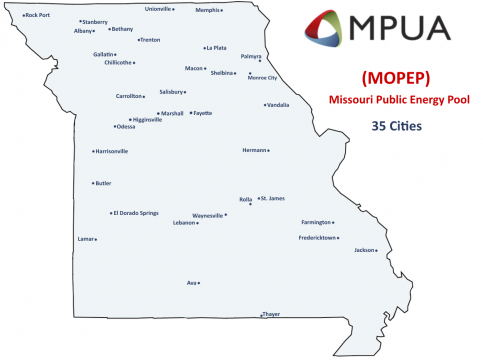JEFFERSON CITY, Mo. – A major development out of Hannibal could be a significant victory for the Clean Line movement in Missouri.
The City of Hannibal voted to get a fifth of their electricity from the project if it gets approved by the Missouri Public Service Commission.
The Hannibal Board of Public Works approved a final draft contract with the Missouri Joint Municipal Electric Utility Commission on Tuesday, which would allow the city to use wind energy to supply 20 percent of their annual energy needs. The Hannibal City Council approved a resolution later that day to allow the mayor to execute the agreement.
 Supporters of the proposed clean energy source say it would not only give a clean and efficient source but also could save the state millions. Currently, 35 cities in Missouri Public Energy Pool (MoPEP) are expecting an estimated $10 million in annual savings, and Hannibal joins Kirkwood and Centralia as cities lining up for a deal.
Supporters of the proposed clean energy source say it would not only give a clean and efficient source but also could save the state millions. Currently, 35 cities in Missouri Public Energy Pool (MoPEP) are expecting an estimated $10 million in annual savings, and Hannibal joins Kirkwood and Centralia as cities lining up for a deal.
Hannibal’s deal is estimated to save the city about $720,000 annually, and the Hannibal Board of Public Works’ budget for the 2018 fiscal year now shows no expected increases in customer costs. The deal would be for roughly 40,000-megawatt hours, with a price of about $18 per megawatt hours.
The PSC mandates investor-owned utilities to use a certain percentage of renewable energies, and by using the wind energy as roughly a quarter of the city’s energy source would boost Hannibal up as one of the statewide leaders in renewable energy.
“This would save us money, and that will eventually hit our ratepayers’ pocketbooks in a good way,” Robert W. Stevenson, the General Manager of the Hannibal Board of Public Works, said.
“We are truly excited about the prospect of providing Hannibal and dozens of other Missouri communities with access to clean, low-cost energy,” Michael Skelly, President of Clean Line Energy, said.
But the deal all hinges on the Grain Belt Express transmission lines being completed. The proposed high-voltage transmission line would move wind-generated power from Kansas across the Midwestern states to Indiana. The Houston-based company already has won approval from other states, but the issue here is that the Missouri PSC rejected the Grain Belt Express line in July 2015 by a vote of 3-2.
Since the first rejection, Clean Line Energy has retooled the project to include municipal utilities as customers as well as expanding protections to landowners to get the PSC’s approval.
“Over the last year, we have made tremendous progress in developing the Grain Belt Express so that it will benefit Missourians for generations to come,” Skelly said. “The Grain Belt Express is a market-based infrastructure project that will save Missouri municipal ratepayers more than $10 million annually, strengthen the state’s electric grid, and create hundreds of jobs. We are hopeful that Missouri regulators will recognize the many long-term benefits that this project will bring to Missouri.”
The news comes as the PSC once again is holding evidentiary hearings in the Grain Belt case this week. In Wednesday’s PSC agenda meeting, Chairman Daniel Hall said he believed the evidentiary hearings for the proposed $2.8 billion project would wrap up on Friday.
If the PSC does allow Clean Line to begin their work in Missouri, Stevenson says it’s estimated to take at least four years before the Hannibal deal is fully implemented.
Benjamin Peters was a reporter for The Missouri Times and Missouri Times Magazine and also produced the #MoLeg Podcast. He joined The Missouri Times in 2016 after working as a sports editor and TV news producer in mid-Missouri. Benjamin is a graduate of Missouri State University in Springfield.



